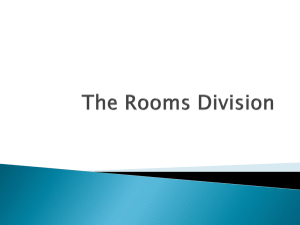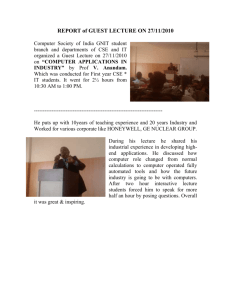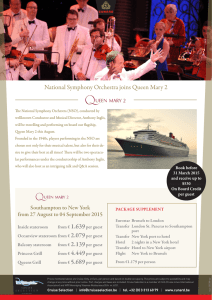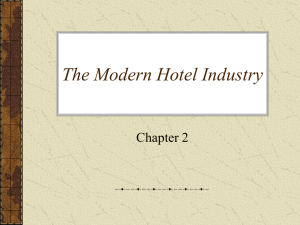Presentation Contacts for editors: CentraLine, c/o Honeywell GmbH
advertisement
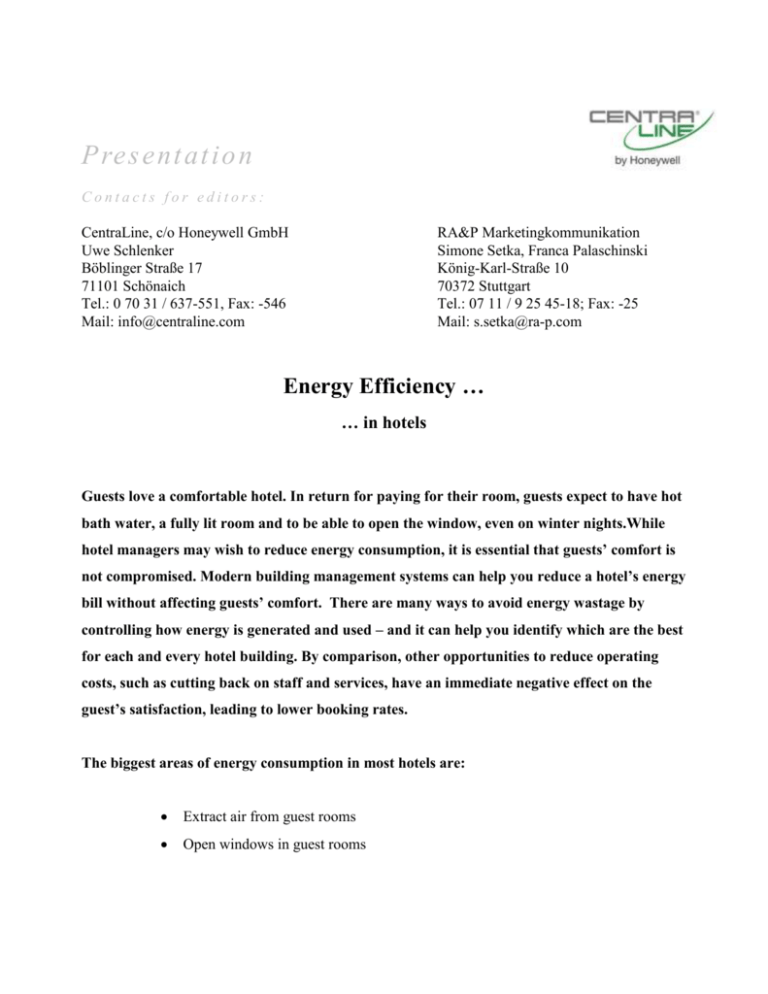
P re s e n t a t i o n Contacts for editors: CentraLine, c/o Honeywell GmbH Uwe Schlenker Böblinger Straße 17 71101 Schönaich Tel.: 0 70 31 / 637-551, Fax: -546 Mail: info@centraline.com RA&P Marketingkommunikation Simone Setka, Franca Palaschinski König-Karl-Straße 10 70372 Stuttgart Tel.: 07 11 / 9 25 45-18; Fax: -25 Mail: s.setka@ra-p.com Energy Efficiency … … in hotels Guests love a comfortable hotel. In return for paying for their room, guests expect to have hot bath water, a fully lit room and to be able to open the window, even on winter nights.While hotel managers may wish to reduce energy consumption, it is essential that guests’ comfort is not compromised. Modern building management systems can help you reduce a hotel’s energy bill without affecting guests’ comfort. There are many ways to avoid energy wastage by controlling how energy is generated and used – and it can help you identify which are the best for each and every hotel building. By comparison, other opportunities to reduce operating costs, such as cutting back on staff and services, have an immediate negative effect on the guest’s satisfaction, leading to lower booking rates. The biggest areas of energy consumption in most hotels are: Extract air from guest rooms Open windows in guest rooms Lights in guest rooms Air conditioning in swimming pool areas Air conditioning in conference rooms Air conditioning in restaurants Fresh air supply to kitchen Hot water supply Air conditioning in the lobby (and the negative effects of open doors) Fig.1: Energy consumers in hotels How can energy efficiency be improved? Fresh air reduction (better controls: air quality control, timers, presence sensors) Volume flow reduction (electric fan energy) Temperature reduction in certain areas (reduction of transmission losses) Reduction and independence of conventional fossil energy (alternative sources of energy) Cooling reduction (better controls, heat/ cool recovery, alternative cooling systems) Operating times (better controls, time programs, connection to other automation systems) Servicing and maintenance, clean coils and replace filters regularly Creating a “green” commitment Which control techniques can be applied? Air quality control Individual room control Automatic set back functions Frequency modulation for fans Low temperature heating systems Warm air curtains for foyer and other parts of the hotel with open doors Heat/ Cool/ Enthalpy recovery What other factors can lead to reduced energy consumption? Manual switches for easy operation by staff Monitoring techniques for energy consumption Integration of existing systems for optimal transparency Tariff negotiations for gas/ oil /electricity purchase Automatic switch to lower cost source, e.g. gas/ oil /district heating What alternative technologies are available to reduce energy bills? Solar heating/ cooling plants Heat pumps CHP (combined heat and power) aggregates for the base load Absorption cooling “Free” energy sources such as wind and water The economic benefits of each of these possibilities must be considered individually. The feasible energy saving options will be different for every hotel building. Certain techniques, such as optimizing the fresh air supply, will provide one of the shortest payback times in most hotels. Other possible measures will vary greatly between buildings, especially where part of it is used for a special purpose, such as gambling, health and fitness, and musical entertainment. Previous CentraLine energy efficiency articles in this series have referred to techniques that can be used to reduce energy consumption in hotels; these include air quality control and applying variable speed fan control. However, here are two examples which apply specifically to hotels. Subject 1: The guest room This is the ideal situation: 1) If a room is not being used, it is maintained at a low “night” temperature, the fresh air is switched off and the lights and TV are off 2) When the guest has checked in, the room is kept on a “standby” temperature and minimum fresh air is supplied 3) When the guest’s presence is detected (by means of either a presence sensor or the hotel card cradle) the normal fresh air supply is provided, the temperature is maintained at the normal comfort level, and the lights will switch on if it too dark outside 4) The extractor fan in the bathroom increases in speed if there is moisture in the bathroom or if the guest starts it manually (subject to a five minute timer) 5) The room changes to standby temperature and minimum fresh air volume if the guest opens the window 6) The room changes to standby temperature and minimum fresh air volume if the guest leaves the room, and the lights and TV will switch off 7) The room changes to night temperature and zero fresh air when the guest leaves and has paid the bill Fig. 2: The ideal guest room (1) Fan Coil Outlet (4) Temperature/Fan Adjustment (2) Bathroom Extract (5) Light Control (3) Window Contact (6) Blind Control Cost saving calculations state that a simple time program for room heating can save energy up to a further 40% compared with only a radiator valve. Standby/occupancy automation will reduce the cost by additional 5-10%, depending on the setpoints and standby times. Clever integration of room automation into the hotel booking system, as provided by CentraLine, will decrease the operating effort down to zero, because of the automatic link between both systems. Fig 3: Modern booking systems (source: “InnQuestSoftware”) These booking systems are linked in various ways to the CentraLine building automation systems and not only manage the air conditioning but also the electricity supply and blinds. Subject 2: Monitoring techniques for energy consumption This is the ideal situation: 1. Electricity power over time is monitored for the different areas of the hotel, e,g, swimming pool, kitchen, restaurant, guest rooms 2. Heating power is monitored per room in order to spot open doors and windows 3. Hot water consumption is monitored to spot leaking valves in guest rooms and elsewhere 4. The amount of cooling energy used in conference rooms and guest room may be metered for possible for billing to the customer 5. Comparing consumption curves from day to day can identify irregular events which can lead to energy reductions 6. Finding base loads and minimizing them Fig. 4: Energy monitoring (1) Is equipment being left on overnight? (2) The building is closed on weekends – what’s using all this energy? Energy monitoring, by itself, does not save energy directly, but allows the hotel manager to see where and when energy is being used, enabling improvements to be made. Hotel managers may feel daunted by the many possible ways there are to save energy in their buildings. Which possibilities deliver the greatest savings, so should be prioritized? How can energy consumption be monitored and optimized? Experienced heating, ventilation and airconditioning specialists, such as the CentraLine Partner companies, have the experience and training to provide hotel managers with the best possible advice. They will be pleased to prepare a costeffective plan which reduces a hotel’s energy costs, immediately and in the long term. The hotel’s operating costs will be reduced significantly, while guests will never notice the difference! Author: Mr. Hannes Lütz Product Manager CentraLine c/o Honeywell GmbH Sources [1] CentraLine [2] CentraLine [3] “InnQuestSoftware” [4] www.energylens.com For more details on CentraLine, see www.CentraLine.com. Detailed information is provided by CentraLine City online at www.centraline.com. More information on CentraLine is also available by calling the information hotline on +49 (0)7031 / 637-456 or by e-mail to info-d@centraline.com. CentraLine is a Honeywell brand. Honeywell International is a diversified group of companies recording sales of 38 billion dollars and regarded as a market leader in the areas of technology and production. Honeywell supplies customers all over the world with aviation products and services, building control technologies (private and commercial), products for the automotive industry, turbochargers and special materials. The company is based in Morris Township, New Jersey, USA. Shares are traded on the New York, London and Chicago stock exchanges. More information is available at www.honeywell.com. CentraLine Honeywell GmbH Böblinger Strasse 17 D-71101 Schönaich www.centraline.com

